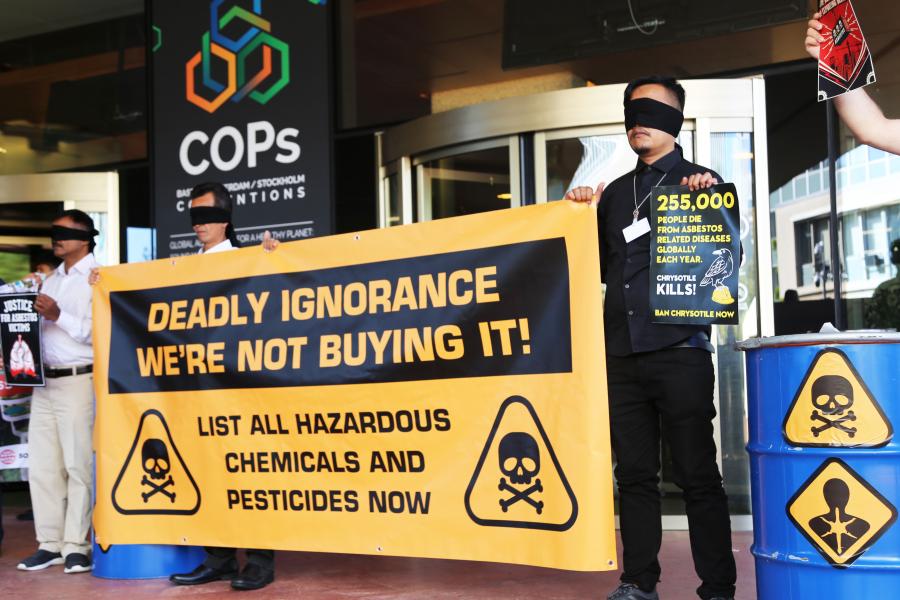
“There needs to be alignment between scientific knowledge and policy… powerful interests in society are trying to confuse and distribute disinformation to foster paralysis and maintain the status quo because the status quo is profitable to certain economic interests.”
— Marcos Orellana, UN Special Rapporteur on Toxics and Human Rights
Every year, millions of workers and communities around the world are exposed to deadly chemicals like asbestos—partly because a handful of countries are blocking global information on safety measures. The Rotterdam Convention, an international treaty designed to share information and protect people from hazardous chemicals and pesticides, is being deliberately stalled by corporate interests and some countries.
At a recent event hosted by the Australian Council of Trade Unions (ACTU), Geneva Environment Network, Union Aid Abroad–APHEDA, and other advocacy groups, UN Special Rapporteur on Toxics and Human Rights Marcos Orellana called for urgent action to fix the Rotterdam Convention’s status quo. He warned that corporate influence has led to a dangerous breakdown between scientific evidence and policy.
A strong Rotterdam Convention is needed to combat “undue corporate influence and potential corporate capture,” said the UN Special Rapporteur on toxics and human rights.
The Asbestos Cover-Up
The failure to act is most evident with chrysotile asbestos, a deadly substance responsible for thousands of deaths worldwide. Since 2006, scientists advising the Rotterdam Convention have repeatedly recommended listing chrysotile asbestos onto the convention, as hazardous. If listed, countries importing asbestos would be warned in advance and given the chance to protect workers and communities.
But for nearly 20 years, a small group of countries with ties to the asbestos industry have blocked the listing at every Conference of the Parties (COP), putting millions of lives at risk. Today, six hazardous chemicals remain blocked, leaving workers and consumers exposed to deadly substances without proper information and warnings.
A fight for justice in Indonesia
This corporate interference isn’t just delaying action—it’s actively harming those who fight for safer workplaces. In Indonesia, APHEDA’s partner organisation Local Initiative on OSH (LION) won a groundbreaking Supreme Court case in 2024, requiring asbestos warning labels on roof sheeting materials. But instead of complying, the Indonesian Fibre Cement Manufacturers’ Association (FICMA) hit back by suing the activists, arguing that because chrysotile asbestos isn’t listed under the Rotterdam Convention, it must be safe.
This lawsuit is a blatant attempt to intimidate consumer groups and activists and delay the Supreme Court’s decision on labelling– a punishment to activists for trying to protect consumers and workers from exposure. The case also highlights how FICMA has taken a global Convention meant to promote information sharing on hazardous chemicals in trade and perversely deployed it as a marketing tool, aiming to expand asbestos use in countries across Asia.
Now is the right time to act
Workers and communities shouldn’t have to fight legal battles just to be informed about the dangers we face daily. The ACTU, Union Aid Abroad–APHEDA, and global campaigners are working with the Australian government and other parties, to make Rotterdam more effective, ensuring that when experts on the Convention’s Chemical Review Committee flag a chemical as hazardous, and a majority of 75% agree, it gets listed without being blocked by a handful of countries.
For the health and safety of workers everywhere, we must break the deadlock and ensure that no industry can hide the truth about hazardous chemicals. Join us in demanding urgent action. Join Union Aid Abroad–APHEDA.
The Asbestos. Not here. Not Anywhere campaign is supported by the Australian Government through the Australian NGO Cooperation Program (ANCP) and the Asbestos and Silica Safety and Eradication Agency (ASSEA) and many Australian Trade Unions.

